Prism Prize Eligible Video: Dana Gavanski - Yesterday is Gone
The 2020 Prism Prize for Best Canadian Music Video was awarded to Peter Huang, for his clip for Jessie Reyez's Far Away. We will continue to profile noteworthy Canadian videos that were eligible for the prize, including this one from a Montreal-based singer/songwriter.

By External Source
The 2020 Prism Prize for Best Canadian Music Video was awarded to Peter Huang, for his clip for Jessie Reyez's Far Away. We will continue to profile noteworthy Canadian videos that were eligible for the prize, including this one from a Montreal-based singer/songwriter.
Dana Gavanski - Yesterday is Gone
Dana Gavanski is a Canadian singer/songwriter, born in Vancouver to a Serbian family and later relocated to Montreal to attend university. Although she always knew she would be working in the entertainment industry, she didn’t see music creation in her future. Setting out to work in film, she quickly switched gears to music. After the release of her debut album in 2020, Gavanski was named one of Exclaim!'s Eight Emerging Canadian Artists.
Gavanski describes her single Yesterday is Gone, off the album of the same name, as “poppier than the other tracks”. The video, directed by Nina Vroemen, an interdisciplinary artist working in video, dance, multimedia installations and sonic experimentation, is set in Montreal’s iconic Metro system. It features the bright and bold colours of the 1960’s as she moves around the underground world. Yesterday is Gone became an ode to the passage of time in this underground world. "In the Metro time and space are distorted; a constant state of arrivals and departures signalling a state of nostalgia and longing — married here with the playful, halting 7/4 meter of the song” says Gavanski when describing the concept and feel of the video.
The lyrics of the song are juxtaposed with the bright colours of the Metro and her '60s inspired outfits, allowing your mind to put together its own conclusions about the meaning behind the lyrics.
Directed by: Nina Vroemen


















